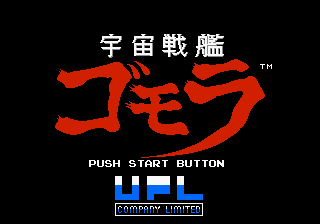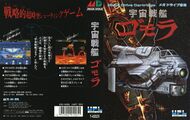Difference between revisions of "Uchuu Senkan Gomora"
From Sega Retro
| Line 71: | Line 71: | ||
| carttop=UchuuSenkanGomora_MD_JP_CartTop.jpg | | carttop=UchuuSenkanGomora_MD_JP_CartTop.jpg | ||
}} | }} | ||
| + | |||
| + | ==References== | ||
| + | <references /> | ||
Revision as of 13:42, 1 July 2016
This short article is in need of work. You can help Sega Retro by adding to it.
| Uchuu Senkan Gomora | |||||
|---|---|---|---|---|---|
| System(s): Sega Mega Drive | |||||
| Publisher: UPL | |||||
| Developer: UPL Aisystem Tokyo | |||||
| Genre: Shoot-'em-Up | |||||
|
Uchuu Senkan Gomora (宇宙戦艦ゴモラ), is a shoot-em-up by UPL, originally released in 1990 for the arcade, and then ported to the Sega Mega Drive in 1991. While the arcade version was released overseas (in the US under license from American Sammy under the name Bio-Ship Paladin), the MD version was only released in Japan — however an American title screen is present in the ROM and displayable if the region is set to US, which may mean a US release was planned (this is unconfirmed).
It is UPL's only Mega Drive game — they would go bankrupt shortly after publishing it (the later Task Force Harrier EX was ported and published by Treco).
Considering the hardware it was ported to and small rom sizes of that time, the game can be considered a faithful port. All stages and bosses are present, the ending is identical. The game displays an unusual high amount of objects on screen.
Contents
Gameplay
Unlike most shooting games you controll a heavy battleship instead of a small efficient glider, resulting in slow paced gameplay unusual for the genre.
![]() shoots your weapons; the laser weapon from your main ship can be charged by holding
shoots your weapons; the laser weapon from your main ship can be charged by holding ![]() .
. ![]() allows you to take control of a beam shot. While
allows you to take control of a beam shot. While ![]() is held down, the D-pad will move a box-shaped target on the screen and
is held down, the D-pad will move a box-shaped target on the screen and ![]() will shoot beam shots toward the target. This beam is multiple times stronger than the regular shot and can hit any position on the screen, for the cost of losing controly over the ship.
will shoot beam shots toward the target. This beam is multiple times stronger than the regular shot and can hit any position on the screen, for the cost of losing controly over the ship.![]() is listed as "PAD MODE", when this is activated, the score counter turns gray to indicate itÄs activated. In this mode, pressing -not holding-
is listed as "PAD MODE", when this is activated, the score counter turns gray to indicate itÄs activated. In this mode, pressing -not holding- ![]() switches between moving the ship and the box shaped target. In each level, you can get orbs which give you either subships that shoot weapons diagonally or certain powerups (such as an automatically moving beam target or doubling the size of your ship).
switches between moving the ship and the box shaped target. In each level, you can get orbs which give you either subships that shoot weapons diagonally or certain powerups (such as an automatically moving beam target or doubling the size of your ship).
Pressing START at the title screen gives you a configuration menu where you can, among other things, choose to play one of two 2-player modes. Normal 2-player mode is 2-player cooperative (two ships on screen at once), while another option allows the second player to take control of the beam laser while you take control of the main ship.
Version differences
The Megadrive version's main differences are:
- The game has a hard coded autofire limit, making autofire generally slower.
- Bosses appear after a short phase (3-5 seconds) that allows one background layer to scroll out, not instantly.
- All Graphics are a tad vertically compressed, likely to compensate for the arcade versions wide screen type resolution.
- Some different colors for bosses, enemies and backgrounds.
- More slowdown, although the arcade version isn't slowdown free either
- Additional scrolling background layers in some stages.
- Background music in the bio station and submarine base have been swapped for an unknown reason.
Trivia
- The game uses 3 fixed 16 color palettes for Player ships, objects and all enemies, only the background color palette is swapped each stage. This is the reason why most bosses have different colors compared to the arcade version
- The game has become a collector's item and is among the more expensive titles
Production credits
- Program Design: Mutaka Ai, Daikoku Hisaya
- Character Design: Masayuki Suzuki, Shigeki Maeda, Ryuji Watamabe
- Background Design: Aiko Hirosawa, Ryuji Watanabe
- Sound Effect: Masato Takahashi
- Director: Tsutomu Fuzisawa
- Special Thanks: Toshio Arai, Isamu Yanagida, ...and UPL all staff
Physical scans
| Sega Retro Average | ||||||||||||||||||||||||||||||||||||||||||||||||||||||||||||||||||||||||||||||||||||
|---|---|---|---|---|---|---|---|---|---|---|---|---|---|---|---|---|---|---|---|---|---|---|---|---|---|---|---|---|---|---|---|---|---|---|---|---|---|---|---|---|---|---|---|---|---|---|---|---|---|---|---|---|---|---|---|---|---|---|---|---|---|---|---|---|---|---|---|---|---|---|---|---|---|---|---|---|---|---|---|---|---|---|---|---|
|
| 58 | |
|---|---|
| Based on 16 reviews | |
References
- ↑ 1.0 1.1 File:CVG UK 121.pdf, page 62 Cite error: Invalid
<ref>tag; name ":File:CVG UK 121.pdf_p62" defined multiple times with different content - ↑ 2.0 2.1 File:SegaPro UK 02.pdf, page 66 Cite error: Invalid
<ref>tag; name ":File:SegaPro UK 02.pdf_p66" defined multiple times with different content - ↑ 1700 igr dlya Sega, "" (RU; 2001-xx-xx), page 55
- ↑ Aktueller Software Markt, "Februar 1992" (DE; 1992-01-10), page 116
- ↑ Beep! MegaDrive, "September 1991" (JP; 1991-08-08), page 35
- ↑ Consoles +, "Novembre 1991" (FR; 1991-11-07), page 90
- ↑ Console XS, "June/July 1992" (UK; 1992-04-23), page 127
- ↑ Famitsu, "1991-10-04" (JP; 1991-09-20), page 40
- ↑ Games-X, "31st October-6th November 1991" (UK; 1991-10-31), page 33
- ↑ Hippon Super, "August 1991" (JP; 1991-07-04), page 89
- ↑ Joypad, "Décembre 1991" (FR; 1991-11-19), page 88
- ↑ Joystick, "Novembre 1991" (FR; 1991-1x-xx), page 129
- ↑ Mega Drive Fan, "December 1991" (JP; 1991-11-08), page 91
- ↑ Sega Pro, "April 1993" (UK; 1993-03-11), page 64
- ↑ Sega Opisaniy i sekretov, "14000 Opisaniy i sekretov" (RU; 2003-03-11), page 27
- ↑ Sega Saturn Magazine, "September 1995" (JP; 1995-08-08), page 86
- Pages with reference errors
- Stubs
- No players field
- Use romtable template
- All games
- Credits without reference
- Creditstable with no console field
- Old-style rating (consolesplus)
- Rating without PDF source
- Old-style rating (cvg)
- Use magref
- Old-style rating (gamesx)
- Old-style rating (segapro)
- Update ratings template
- 5 old ratings

